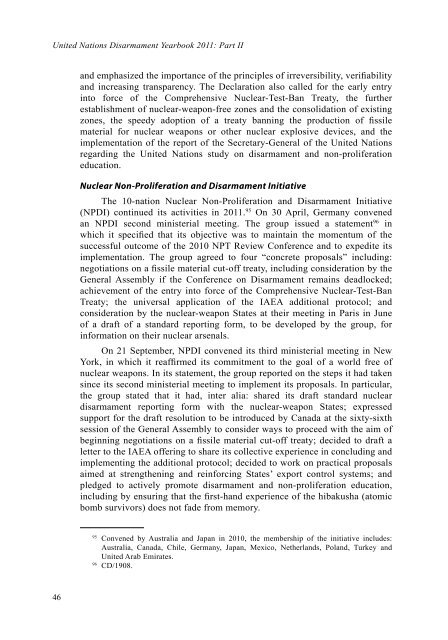DYB2011-Part-II-web
DYB2011-Part-II-web
DYB2011-Part-II-web
Create successful ePaper yourself
Turn your PDF publications into a flip-book with our unique Google optimized e-Paper software.
United Nations Disarmament Yearbook 2011: <strong>Part</strong> <strong>II</strong><br />
46<br />
and emphasized the importance of the principles of irreversibility, verifiability<br />
and increasing transparency. The Declaration also called for the early entry<br />
into force of the Comprehensive Nuclear-Test-Ban Treaty, the further<br />
establishment of nuclear-weapon-free zones and the consolidation of existing<br />
zones, the speedy adoption of a treaty banning the production of fissile<br />
material for nuclear weapons or other nuclear explosive devices, and the<br />
implementation of the report of the Secretary-General of the United Nations<br />
regarding the United Nations study on disarmament and non-proliferation<br />
education.<br />
Nuclear Non-Proliferation and Disarmament Initiative<br />
The 10-nation Nuclear Non-Proliferation and Disarmament Initiative<br />
(NPDI) continued its activities in 2011. 95 On 30 April, Germany convened<br />
an NPDI second ministerial meeting. The group issued a statement96 in<br />
which it specified that its objective was to maintain the momentum of the<br />
successful outcome of the 2010 NPT Review Conference and to expedite its<br />
implementation. The group agreed to four “concrete proposals” including:<br />
negotiations on a fissile material cut-off treaty, including consideration by the<br />
General Assembly if the Conference on Disarmament remains deadlocked;<br />
achievement of the entry into force of the Comprehensive Nuclear-Test-Ban<br />
Treaty; the universal application of the IAEA additional protocol; and<br />
consideration by the nuclear-weapon States at their meeting in Paris in June<br />
of a draft of a standard reporting form, to be developed by the group, for<br />
information on their nuclear arsenals.<br />
On 21 September, NPDI convened its third ministerial meeting in New<br />
York, in which it reaffirmed its commitment to the goal of a world free of<br />
nuclear weapons. In its statement, the group reported on the steps it had taken<br />
since its second ministerial meeting to implement its proposals. In particular,<br />
the group stated that it had, inter alia: shared its draft standard nuclear<br />
disarmament reporting form with the nuclear-weapon States; expressed<br />
support for the draft resolution to be introduced by Canada at the sixty-sixth<br />
session of the General Assembly to consider ways to proceed with the aim of<br />
beginning negotiations on a fissile material cut-off treaty; decided to draft a<br />
letter to the IAEA offering to share its collective experience in concluding and<br />
implementing the additional protocol; decided to work on practical proposals<br />
aimed at strengthening and reinforcing States’ export control systems; and<br />
pledged to actively promote disarmament and non-proliferation education,<br />
including by ensuring that the first-hand experience of the hibakusha (atomic<br />
bomb survivors) does not fade from memory.<br />
95 Convened by Australia and Japan in 2010, the membership of the initiative includes:<br />
Australia, Canada, Chile, Germany, Japan, Mexico, Netherlands, Poland, Turkey and<br />
United Arab Emirates.<br />
96 CD/1908.


